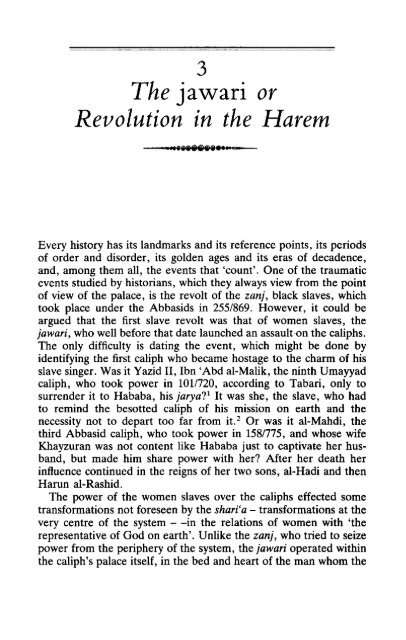Fatima.Mernessi_The-Forgotten-Queens-of-Islam-EN
Fatima.Mernessi_The-Forgotten-Queens-of-Islam-EN
Fatima.Mernessi_The-Forgotten-Queens-of-Islam-EN
Create successful ePaper yourself
Turn your PDF publications into a flip-book with our unique Google optimized e-Paper software.
3<br />
<strong>The</strong> jawari or<br />
Revolution in the Harem<br />
Every history has its landmarks and its reference points, its periods<br />
<strong>of</strong> order and disorder, its golden ages and its eras <strong>of</strong> decadence,<br />
and, among them all, the events that 'count'. One <strong>of</strong> the traumatic<br />
events studied by historians, which they always view from the point<br />
<strong>of</strong> view <strong>of</strong> the palace, is the revolt <strong>of</strong> the zanj, black slaves, which<br />
took place under the Abbasids in 255/869. However, it could be<br />
argued that the first slave revolt was that <strong>of</strong> women slaves, the<br />
jawari, who well before that date launched an assault on the caliphs.<br />
<strong>The</strong> only difficulty is dating the event, which might be done by<br />
identifying the first caliph who became hostage to the charm <strong>of</strong> his<br />
slave singer. Was it Yazid II, Ibn 'Abd al-Malik, the ninth Umayyad<br />
caliph, who took power in 101/720, according to Tabari, only to<br />
surrender it to Hababa, his jaryal 1 It was she, the slave, who had<br />
to remind the besotted caliph <strong>of</strong> his mission on earth and the<br />
necessity not to depart too far from it. 2 Or was it al-Mahdi, the<br />
third Abbasid caliph, who took power in 158/775, and whose wife<br />
Khayzuran was not content like Hababa just to captivate her husband,<br />
but made him share power with her? After her death her<br />
influence continued in the reigns <strong>of</strong> her two sons, al-Hadi and then<br />
Harun al-Rashid.<br />
<strong>The</strong> power <strong>of</strong> the women slaves over the caliphs effected some<br />
transformations not foreseen by the shari'a - transformations at the<br />
very centre <strong>of</strong> the system —in the relations <strong>of</strong> women with 'the<br />
representative <strong>of</strong> God on earth'. Unlike the zanj, who tried to seize<br />
power from the periphery <strong>of</strong> the system, the jawari operated within<br />
the caliph's palace itself, in the bed and heart <strong>of</strong> the man whom the


